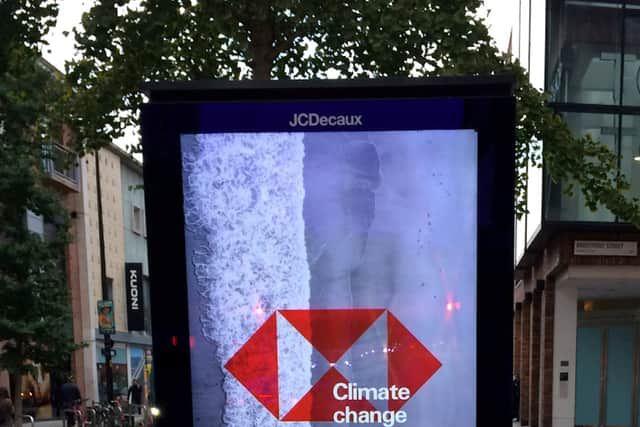HSBC’s Bristol ads banned for ‘misleading’ public on its greenhouse gas emissions
and live on Freeview channel 276
Banking giant HSBC has had two ads banned for failing to mention its contribution to greenhouse gas emissions in a campaign bragging of its green credentials, the advertising watchdog has ruled.
The Advertising Standards Authority (ASA) has ruled that the poster adverts, which were displayed at bus stops in Bristol and London in October last year, misled viewers.
Advertisement
Hide AdAdvertisement
Hide AdThe ads told of a multi-billion investment in green financing to reach net zero and that the bank planned to plant two million trees by 2025.
However they failed to mention they also help businesses that produced 65.3 million tonnes of carbon in gas and oil alone.
The first of the two posters, which were on display in the run up to last year’s COP26 UN Climate Change Conference in Glasgow, featured an aerial image of waves crashing onto a shore.
The text alongside it said the bank is aiming to provide £877 billion in financing and investment around the world to help the transition to net zero.
Advertisement
Hide AdAdvertisement
Hide AdThe second poster showed tree growth rings which claimed the bank is helping to plant two million trees.
The watchdog received 45 complaints about the adverts which claimed they were misleading because they omitted “significant information” about the bank’s contribution to carbon dioxide and greenhouse gas emissions.


It ruled that the adverts breached rules on misleading advertising and environmental claims.
They ruled the ads must not appear again in the form complained of.
Advertisement
Hide AdAdvertisement
Hide AdThe watchdog said in its ruling: “The CAP (non-broadcast advertising) Code required that the basis of environmental claims must be clear and that unqualified claims could mislead if they omit significant information.
“We considered consumers would understand the claims ‘HSBC is aiming to provide up to £877 billion in financing and investment globally to help our clients transition to net zero’ in ad (a), and ‘we’re helping to plant two million trees which will lock in 1.25 million tonnes of carbon in their lifetime’ in ad (b) to mean that HSBC was making, and intended to make, a positive overall environmental contribution as a company.
“We considered that the use of imagery from the natural world, and in particular ad (a)’s image of waves crashing on a beach, contributed to that impression.
“However, we did not consider that meant that consumers would understand the intricacies of transitioning to net zero, and would not expect that HSBC, in making unqualified claims about its environmentally beneficial work, would also be simultaneously involved in the financing of businesses which made significant contributions to carbon dioxide and other greenhouse gas emissions and would continue to do so for many years into the future.”
Advertisement
Hide AdAdvertisement
Hide Ad“The Annual Report indicated that HSBC intended to invest up to £877 billion in helping its clients transitioning to net zero.
“We acknowledged HSBC’s comments concerning the level of natural gas and oil production required in 2050, as stated by the IEA, and understood that some level of financing would be required for those activities.
“We concluded that the ads omitted material information and were therefore misleading.
“We told HSBC UK Bank plc to ensure that future marketing communications featuring environmental claims were adequately qualified and did not omit material information about its contribution to carbon dioxide and greenhouse gas emissions.”
Advertisement
Hide AdAdvertisement
Hide AdHSBC said it planned a 34 per cent reduction in absolute oil and gas financed emissions, and a 75 per cent reduction in financed emissions intensity for the power and utilities sector by 2030.
The bank said claims in the second advert were true because it had entered into a four year partnership with the National Trust to create 2,000 hectares of carbon-rich woodland.
Comment Guidelines
National World encourages reader discussion on our stories. User feedback, insights and back-and-forth exchanges add a rich layer of context to reporting. Please review our Community Guidelines before commenting.